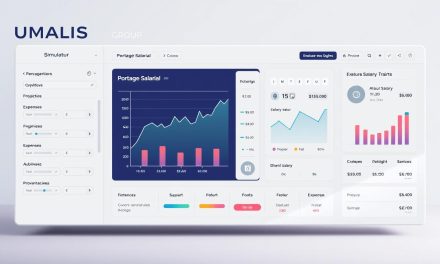Working as an independent contractor lets you choose your projects and work on your own schedule. This flexibility is a big draw for many, as it helps balance work and personal life. About 34% of contractors say they love the freedom to pick their projects, which makes them happier at work.
Freelancers can also earn more by setting their own rates. But, they must plan their finances carefully, as they don’t get benefits like health insurance. About 79% of contractors don’t have health insurance from their employers. They must take care of their own insurance and retirement savings.
One benefit is salary portage, which lets you get a salary while working on projects. You can find more about it on websites like https://simulateur-portage-salarial.fr/.
Table of Contents
Key Takeaways
- Independent contractors control over 50% of their work environment, allowing for flexibility and autonomy.
- Independent contractor benefits include the ability to choose projects and adjust rates based on workload, leading to higher earnings.
- Self-employed individuals often prioritize health insurance, with about 60% of freelancers considering it a top priority.
- Independent contractors can deduct up to 20% of their business income as a Qualified Business Income (QBI) deduction, subject to eligibility requirements.
- Approximately 57% of independent contractors believe that companies should offer them healthcare benefits to attract top talent in competitive industries.
- Independent contractors typically do not receive employer-provided benefits, affecting their overall compensation package compared to traditional employees.
- Compliance with local laws and tax regulations is critical for independent contractors, affecting their operational costs and structure.
Overview of Independent Contractor Status
Knowing if you’re an independent contractor is key in the gig economy. These workers are self-employed and work on a project basis. They have to handle their own benefits, taxes, and retirement plans. They don’t get the same benefits as employees, like health insurance or paid time off.
For gig worker benefits, independent contractors need to look at their own contractor incentives and freelance benefits package. They must pay their own FICA taxes, which is 7.65% of their income. They can also deduct more expenses than employees, which is a big plus.
To learn more about the differences between employees and contractors, check out this website. It explains the benefits and drawbacks of each choice.
Definition and Characteristics
Independent contractors are also called 1099 workers, showing they’re self-employed. They don’t get federal law protections for minimum wage or overtime. They also can’t take job-protected leave under the federal Family and Medical Leave Act (FMLA).
Differences Between Employees and Contractors
Employees and contractors differ in autonomy, flexibility, and who pays for benefits and taxes. Contractors have more control over their work but must pay for their own benefits and taxes. Employees have job security and benefits but less control over their work.
- Autonomy and flexibility
- Responsibility for benefits and taxes
- Job security and access to benefits
Understanding these differences helps contractors navigate the gig economy. By focusing on their gig worker benefits, contractor incentives, and freelance benefits package, they can achieve financial security.
Common Benefits Available to Independent Contractors

As an independent contractor, you get many benefits. These help you manage money, stay healthy, and plan for the future. One big independent worker advantage is choosing health insurance. You can pick from individual or group plans to cover your health needs.
Also, freelancer benefits include options for retirement savings. You can use SEP-IRAs or solo 401(k)s to save for later and cut taxes. Plus, you can deduct business expenses, which lowers your taxes.
- Health insurance options, such as individual plans or group plans
- Retirement plan alternatives, such as SEP-IRAs or solo 401(k)s
- Tax deductions, such as business expense deductions
By using these benefits, independent contractors can manage money, stay healthy, and plan for the future. This way, they enjoy the freelancer benefits of being their own boss.
Health Insurance for Independent Contractors
As an independent contractor, getting health insurance is key. More workers are now independent, changing how we work. They must buy their own insurance, which can be pricey without employer help. A contractor benefits package can help lower these costs.
There are many health plans for independent contractors. You can choose from individual, group, or health reimbursement plans. Individual plans give you freedom, while group plans offer stability. Health reimbursement plans can help pay for medical costs and cut your taxes. Finding affordable insurance can be tough, but there are resources to help you find the right plan.
Some important stats to keep in mind:
- About 70% of gig workers look for jobs with benefits.
- Health insurance for independent contractors can cost 50% more than for employees.
- If you earn between 100% and 400% of the federal poverty level, you might get subsidies. These can lower your premiums by 70% on average.
When picking a health insurance plan, think about what you need. Look for freelance advantages and independent contractor benefits that fit your lifestyle. By knowing your options and using available resources, you can find a contractor benefits package that meets your needs without breaking the bank.
| Plan Type | Premium Costs | Coverage |
|---|---|---|
| Individual Plans | Varying | Flexible, autonomous |
| Group Plans | Lower | Secure, stable |
| Health Reimbursement Arrangements | Reduced taxable income | Reimburses medical expenses |
Retirement Planning for Independent Contractors
As an independent contractor, it’s key to know your retirement options. You can pick from solo 401(k)s, IRAs, and Roth IRAs. These plans let you choose how to invest and how much to contribute.
The 2024 limit for solo 401(k) contributions is up to $69,000. Or, it’s 100% of what you earn, whichever is less. Plus, if you’re over 50, you can make extra contributions. It’s important to find the right plan for your goals.
To learn more about retirement planning for independent contractors, visit this resource for valuable information and guidance.
| Plan | 2024 Contribution Limit |
|---|---|
| Solo 401(k) | up to $69,000 |
| IRA | $6,500 (or $7,500 if over 50) |
| SEP IRA | up to 25% of compensation, with a $345,000 limit |
Understanding these options and limits helps independent contractors plan for retirement. They can use self-employed perks and gig worker benefits to secure their financial future.
Tax Implications for Independent Contractors

As an independent contractor, knowing your taxes is key. It helps you lower your taxable income and enjoy independent contractor benefits. You’ll face self-employment tax, which covers Social Security and Medicare. This tax is 15.3% of your net earnings, split between Social Security and Medicare.
You must pay estimated taxes every quarter. Clients also need to give you Form 1099-NEC if you earn over $600 in a year. To cut your taxes, you can deduct business costs like a home office or vehicle expenses. Your freelance benefits package might also include things like the Earned Income Tax Credit (EITC). This can give you credits up to $6,728 if you have kids.
Keeping good records of your business expenses is vital. This way, you can use these deductions to lower your taxes. By understanding your taxes and using independent worker advantages, you can save money and earn more.
Legal Protections for Independent Contractors

As an independent contractor, knowing your legal rights is key. The gig economy has made more workers independent contractors. It’s important to understand your 1099 perks and the challenges you face. This includes the freedom to choose your projects but also navigating freelancer benefits and getting a contractor benefits package.
Independent contractors have rights to fair pay, safe work, and protection from discrimination. It’s also vital to grasp worker classification laws, which can be complex and vary by state. Misclassifying workers can result in penalties, so knowing how to classify yourself and your workers is essential.
Here are some key statistics to consider:
- Roughly 30% of all U.S. workers are classified as independent contractors.
- Independent contractors typically earn 15% to 30% less than their employee counterparts after accounting for benefits and job security.
- Approximately 80% of independent contractors do not have access to employer-provided health insurance.
Understanding your legal protections and rights as an independent contractor helps you navigate the gig economy confidently. Stay updated on laws and regulations that might impact your work and benefits.
| Benefit | Independent Contractor | Employee |
|---|---|---|
| Health Insurance | Not typically provided | Often provided by employer |
| Retirement Plan | Not typically provided | Often provided by employer |
| Tax Deductions | Self-employment tax | Employer-paid taxes |
Professional Development Opportunities
As an independent contractor, you can grow your career and earn more. You can find training, certifications, and networking resources. These help you improve your skills, stay ahead in the gig economy, and enjoy being your own boss.
Some key benefits include:
- Increased earning
- Better skills and knowledge
- Being more competitive
- Finding new jobs
- More freedom and control
Deel says using online tools can help manage your work better. Simulateur Portage Salarial also suggests getting help with finances and admin to improve your business.
Investing in your growth can make you thrive as a freelancer. With the right skills and support, you can reach your career goals.
| Benefits | Description |
|---|---|
| Increased earning | Professional development can lead to higher paying jobs and increased earning |
| Improved skills and knowledge | Training and certification programs can enhance skills and knowledge, making independent contractors more competitive |
| Enhanced competitiveness | Professional development can help independent contractors stay competitive in the gig economy |
Managing Your Finances as an Independent Contractor
Managing your money well is key when you work on your own. It’s important to know about gig worker benefits and contractor incentives. A good freelance benefits package helps you deal with the ups and downs of being an independent contractor.
It’s vital to budget for income that can change and expenses that might vary. Use accounting tools to keep track of your money. You can also check out online resources for tips on managing your finances.
Some important things to think about include:
- Setting aside money for taxes, including self-employment taxes
- Claiming deductions for business expenses to reduce taxable income
- Investing in a freelance benefits package that includes health insurance and retirement planning
By understanding these points and using gig worker benefits and contractor incentives, you can make a solid financial plan. This plan will help you reach your career goals and ensure your financial future.
Resources for Independent Contractors
As an independent contractor, you have many resources to help you succeed. You can connect with other freelancers online. This gives you access to training and helps you stay updated on industry trends.
Online platforms and communities are key resources. Sites like freelance networking sites offer tools and resources. Professional associations also provide support, including 1099 perks and freelancer benefits like insurance discounts.
Some benefits of these resources include:
- Access to training and development opportunities
- Networking opportunities with other independent contractors
- Discounts on business expenses, such as insurance and equipment
- Access to online platforms and communities to help you manage your business
By using these resources, you can thrive as an independent contractor. Enjoy the many freelancer benefits this career offers.
Conclusion: Maximizing Independent Contractor Benefits
As an independent contractor, you can boost your benefits and financial security. Understanding your options and making smart choices is key. By planning your finances well, optimizing taxes, and keeping up with trends, you can thrive in the gig economy.
It’s important to know about the freelance benefits package you can get. This includes health insurance and retirement plans. These tools help you stay financially stable and succeed as an independent contractor.
Enjoying the freedom of your career while focusing on your finances is essential. Stay informed, be adaptable, and proactive. This way, you can confidently succeed in the gig economy and reach your goals.
FAQ
What are the key benefits of being an independent contractor?
Working as an independent contractor gives you freedom. You can pick projects that match your skills and interests. It also lets you balance work and life better and earn more.
What are the differences between employees and independent contractors?
Independent contractors work on their own, taking on projects for various clients. They handle their own benefits, taxes, and retirement plans. They don’t get the same benefits as employees, like health insurance or paid time off.
What health insurance options are available to independent contractors?
Independent contractors can choose from many health insurance options. These include individual plans, group plans, and health reimbursement arrangements. Finding affordable coverage can be tough, but there are resources to help.
How can independent contractors save for retirement?
Independent contractors must plan their own retirement. Solo 401(k)s offer high contribution limits and flexible investment options. IRAs and Roth IRAs provide security and stability for retirement.
What tax deductions are available to independent contractors?
Independent contractors can lower their taxable income with various tax deductions. These include the home office deduction or the business use of their car. This can help reduce their tax bill.
What rights and protections do independent contractors have?
Independent contractors have rights and protections under the law. They have the right to fair pay, safe work conditions, and protection from discrimination. Knowing worker classification laws is key to avoiding penalties.
What professional development opportunities are available to independent contractors?
Independent contractors can find many professional development opportunities. These include training, certification programs, and networking resources. These can help advance your career, increase earnings, and stay competitive in the gig economy.
How can independent contractors manage their finances effectively?
Independent contractors face a variable income. It’s important to manage finances well and budget for the gig economy’s ups and downs. Budgeting software and accounting tools can help track income and expenses, reduce taxes, and make informed financial decisions.
What resources are available to support independent contractors?
Independent contractors have access to many resources and support networks. These include online platforms, communities, and professional associations. These resources help connect with others, access training, and stay updated on industry trends.
Source Links
- Independent Contractor vs Employee: Benefits and Differences Every Consultant Should Know | Pollen – https://www.runpollen.com/articles/independent-contractor-vs-employee-benefits-and-differences-every-freelancer-should-know
- 5 Major Benefits of Being an Independent Contractor in 2024 – https://www.gloroots.com/blog/benefits-of-being-an-independent-contractor
- Benefits and Health Insurance for 1099 Employees | eHealth – https://www.ehealthinsurance.com/resources/small-business/offer-health-insurance-1099-employee
- Pros and Cons of Working as an Independent Contractor – https://www.thebalancemoney.com/working-as-an-independent-contractor-4047544
- Employees vs. Independent Contractors: Cheat Sheet | Leavitt Recreation & Hospitality – https://www.leavitt.com/lrh/blog/employees-vs-independent-contractors-cheat-sheet
- Benefits for Independent Contractors – https://remote.com/blog/how-to-offer-benefits-1099-international-contractors
- 1099 Benefits: What Freelancers Should Know – https://www.hellobonsai.com/blog/1099-benefits
- Should You Offer Benefits to a 1099 Employee? – https://www.peoplekeep.com/blog/offering-1099-employee-benefits
- A guide to health insurance for independent contractors – https://remote.com/blog/health-insurance-independent-contractors
- Retirement plans for self-employed people – https://www.irs.gov/retirement-plans/retirement-plans-for-self-employed-people
- Self-Employed Retirement Plans: Know Your Options – NerdWallet – https://www.nerdwallet.com/article/investing/retirement-plans-self-employed
- Independent Contractor vs Self Employed: A Simple Guide – https://www.playroll.com/blog/independent-contractor-vs-self-employed
- Independent Contractor: Self-employed Taxes Explained + Definition – https://www.everlance.com/self-employed-tax-glossary/independent-contractor-self-employed-taxes-explained-definition
- Employee Vs. Independent Contractor: Legal Implications Explained – https://www.dhweberman.com/post/employee-vs-independent-contractor-legal-implications-explained
- 10 Legal Rights of Independent Contractors – https://www.mbopartners.com/blog/how-manage-small-business/what-are-your-rights-as-an-independent-contractor/
- 16 Benefits of Hiring Contractors vs Employees – https://www.mbopartners.com/blog/workforce-management/benefits-of-hiring-independent-contractors-versus-employees/
- Independent contractor vs. employee: Key differences, benefits, and compliance considerations – https://oforce.com/blog/independent-contractor-vs.-employee-understanding-classification-for-compliance
- Should You Offer Employee Benefits to Contractors? – https://www.remotelytalents.com/blog/should-you-offer-employee-benefits-to-contractors
- Independent Contractor: Definition, How Taxes Work, and Example – https://www.investopedia.com/terms/i/independent-contractor.asp
- What is an Independent Contractor? | Benefits, and Responsibilities – https://gogloby.io/glossary/independent-contractor/
- 16 amazing 1099 tax deductions for independent contractors – https://www.nextinsurance.com/blog/tax-deductions-for-independent-contractors/
- Using VA Benefits for Independent Contractors and Freelancers – Warrior Allegiance : Are you VA Rated 90% or less? Let’s talk. – https://warriorallegiance.com/using-va-benefits-for-independent-contractors-and-freelancers/
- The Complete Guide to Paying Independent Contractors – Omni HR – https://www.omnihr.co/blog/independent-contractor
- Self-Employed vs Independent Contractor: Legal Differences – https://www.selfemployed.com/self-employed-vs-independent-contractor-legal-differences/
- 10 Benefits of Hiring Independent Contractors Over Employees – https://www.rivermate.com/blog/top-10-benefits-of-hiring-independent-contractors
- 1099 Contractor: Key Differences, Benefits, and Tax Responsibilities – https://www.upcounsel.com/1099-contractor





